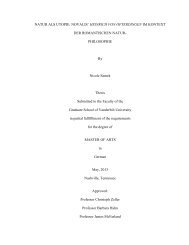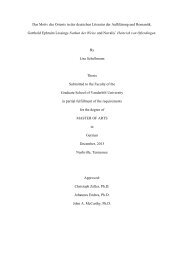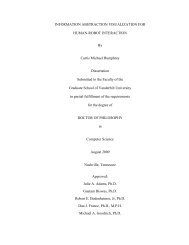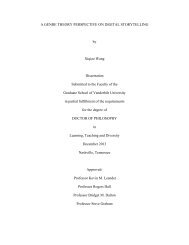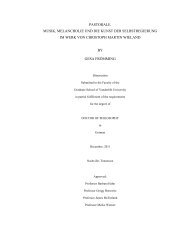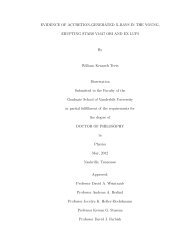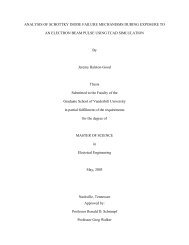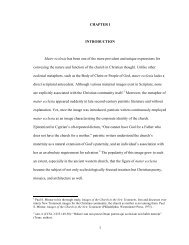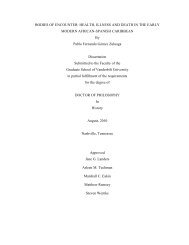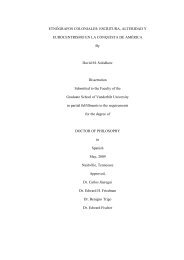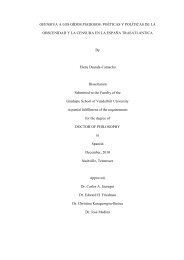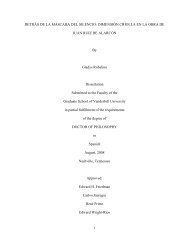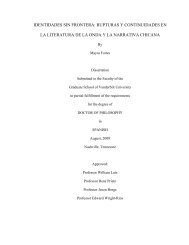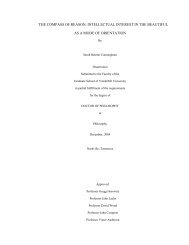THE DEATH OF DIONYSOS - ETD - Vanderbilt University
THE DEATH OF DIONYSOS - ETD - Vanderbilt University
THE DEATH OF DIONYSOS - ETD - Vanderbilt University
You also want an ePaper? Increase the reach of your titles
YUMPU automatically turns print PDFs into web optimized ePapers that Google loves.
Friedrich Schiller, had likewise observed with satisfaction Wilhelm’s new “Selbstgefühl”<br />
in Book Eight: a new sensibility of self–today we would say “self-esteem”–that alone<br />
might qualify him for marriage to Natalie and inclusion among the mostly aristocratic<br />
Society of the Tower. 2 Schiller was right. The Wilhelm who objects to being treated like<br />
a child is not the same one who once was crushed over the appearance of a manlier rival<br />
for the love of Mariane and its favors. Even more striking is his resilience in the face of<br />
possible personal guilt in the fate of Mariane, and even of Mignon. 3<br />
Strangely, the whole question of guilt on Wilhelm’s part in other’s misfortunes<br />
represents something of a black hole in critical response to the Lehrjahre. In addition to<br />
Mignon and Mariane, we have only to remember the absurd but nevertheless sad<br />
consequences of his Platonic romance with the countess, and it becomes clear that Goethe<br />
himself did not go out of his way to spare his protagonist any occasion for remorse. His<br />
immunity to guilt must therefore lie in Wilhelm’s consciousness. A rare exception to an<br />
otherwise general silence on this matter is a recent study by Stefan Blessin, who stresses<br />
the radically modern ethos and world view that prevail in Goethe’s novels. 4 While he<br />
absolves Wilhelm of any direct responsibility for the deaths of Mignon and others in the<br />
Lehrjahre, Blessin acknowledges an exception in the case of Mariane:<br />
2 Schiller is referring specifically to Wilhelm’s indignant objection to the manipulations or<br />
machinations of Jarno and the Tower in his life. He writes to Goethe: “Ich gestehe, daß es mir<br />
ohne diesen Beweis von Selbstgefühl bei unserm Helden peinlich sein würde, ihn mir mit dieser<br />
Klasse so eng verbunden zu denken, wie nachher durch die Verbindung mit Natalien geschieht.”<br />
[“I confess that without this proof of self-esteem in our hero, I would be embarrassed to imagine<br />
him connected as closely to this circle as later is the case with his (marriage) tie to Natalie.”] See<br />
letter to Goethe of July 5, 1796 (HA VII, 638).<br />
3 Wilhelm berates himself in Book Eight for having neglected Mignon: “Ich zog das liebe Kind an,<br />
seine Gegenwart ergötzte mich, und dabei hab’ ich es aufs grausamste vernachlässigt” (504).<br />
[Wilhelm to himself: “You took charge of the poor child, her companionship delighted you, and<br />
yet you have cruelly neglected her” (EAB 308).] Nevertheless, this self-recrimination represents<br />
his new social conscience– the need to send her to school–rather than any sense of personal<br />
responsibility for her.<br />
4<br />
See by Blessin, Goethes Romane: Aufbruch in die Moderne (Paderborn: Ferdinand Schöningh,<br />
1996).<br />
x



